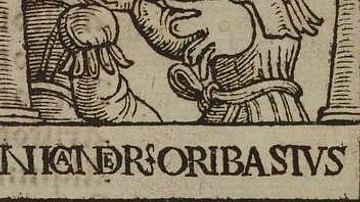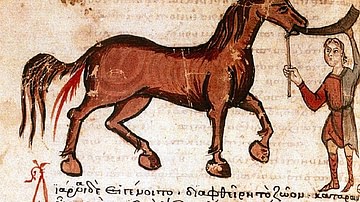
Galen (129-216 CE) was a Greek physician, author, and philosopher, working in Rome, who influenced both medical theory and practice until the middle of the 17th century CE. Owning a large, personal library, he wrote hundreds of medical treatises including anatomical, physiological, pharmaceutical, and therapeutic works. With principles based on his anatomical dissections, he spoke and wrote extensively on the anatomy of the body emphasizing the role of the heart, brain, and blood. While he criticized many of his contemporaries, he embraced the ideas put forth by the Greek physician and theorist Hippocrates (460-370 BCE), primarily his concept of the four humours that controlled the human condition: blood, phlegm, black bile, and yellow bile.
Much of our knowledge of early medicine comes from Galen's writings. Like Hippocrates and other theorists Galen believed that illness was caused by an imbalance, so how does one restore the balance: bleeding, enemas, and vomiting. Aside from his writings on medicine, he wrote extensively on language, logic, psychology, ethics, and even moral philosophy. Regrettably, most of his works no longer exist or survive only in fragments. He lost many of his writings, instruments, and medicines in a storeroom fire in 192 CE.
Early Life & Education
Born in 129 CE in the Asia Minor city of Pergamon, Galen was the son of the wealthy architect Nikon and was initially educated in both rhetoric and philosophy. The Pergamon of his youth was home to a sanctuary dedicated to the god of medicine Asclepius. His father, a member of the Roman elite, had assisted in the renovation of Pergamon's temple complex dedicated to Zeus. At the age of 16, Galen changed educational directions, possibly at the suggestion of his father, and decided to study medicine, eventually completing his schooling at both Smyrna, located on the Aegean coast, and Alexandria where he studied both anatomical science and physiological theory. At the time Alexandria was the premier center for the study of medicine in the ancient world. After the death of his father in 149/50 CE, he continued his studies as he traveled throughout the Mediterranean. In 157 CE he returned to his home town of Pergamon to be the physician to a group of gladiators; a position that provided him with an opportunity to study anatomy.
Career in Rome
By the 2nd century CE, Pergamon had fallen under the control of the Roman Empire. Never marrying, Galen eventually left Pergamon in 162 CE to pursue a career in Rome. In Rome, he gave a number of public anatomical demonstrations using pigs, monkeys, sheep, and goats. Although Hellenistic physicians had been doing human dissections in private, the Romans did not - either in private or public. Despite the outrage, Galen believed that the knowledge of anatomy was vital to a physician. He would only briefly leave Rome during a plague outbreak brought by troops returning from the East. While it may be convenient to blame the plague, he probably was driven out of the city by hostile conspirators.
Despite the opposition to his unorthodox behavior, as his knowledge and skill became evident, he began to treat many of Rome's most influential citizens. Eventually, he became the court physician for the emperors Marcus Aurelius (r. 161-180 CE), Commodus (r. 180-192 CE) and Septimius Severus (r. 193-211 CE). Being a student and practitioner of Stoic philosophy, Emperor Marcus Aurelius called him the “best of physicians and the first of philosophers.” To Galen, a good physician also had to be a good philosopher. His autobiography On My Own Opinions speaks on the correlation between the two. Having returned to the city in 169 CE, he remained there until his death in 216 CE - the exact date and place of burial are unknown.
Philosophy
Bordering on agnosticism - he was an avowed monotheist - he said it was impossible to know if the gods existed, how many there were, or even if the soul was mortal. While he may have had doubts about the existence of the gods, he believed that medicine was an exact yet human science. To Galen, the body was an orderly construct of nature. Echoing a modern day-theory, for optimum health, he recommended exercise, a balanced diet, good hygiene, and bathing. His arguments about the structure of the body went far beyond the theories fostered by the Greek philosopher Aristotle. Galen's beliefs were founded on the theories of Herophilus and Erasistratus. Herophilus (330-260 BCE) of Alexandria established a school of anatomy in Alexandria and was one of the first to conduct dissections of human cadavers in public. He wrote on the nervous system, the pulse, as well as the valves and chambers of the human heart. Herophilus agreed with the accepted theory that an imbalance of the humours caused disease. His disciple and collaborator Erasistratus (315-240 BCE) was one of the first to distinguish between the arteries and veins. Like Herophilus, he conducted public dissections as well as studied human respiration, the nervous system, and muscular activity.
Galen's interests ranged from the study of blood and the heart to tuberculosis and even cancer. Galen demonstrated a profound allegiance to many of the theories of the Greek philosopher Plato. The early Greeks and Egyptians typically believed that the brain had no psychological significance and that it was the heart that was the primary source of an individual's intelligence, emotions, and sensations. Concerning the human heart, Plato challenged these cardio-centric views and said the heart had no cognitive significance. There was a tripartite explanation for the relationship of the soul and body in which parts of the soul - mind, spirit, and desire - are located in the heart, brain, and liver. Galen reinforced these ideas when he said it was the brain that was the center of sensation, speech, intellect, and consciousness.

Unfortunately, Galen also believed that anger was due to the excess of bile in the heart. Aside from his studies of the nervous system, Galen also wrote on cancer or 'karkinos' a word meaning crab. As with other Greek and Roman physicians, Galen believed the characteristic tumors of cancer - he identified 61 kinds - were due to an excess of black bile. The latter was an idea that would go unchallenged for more than 1500 years. Galen, like Hippocrates, was against any attempt to remove a tumor, believing the risk of death outweighed the possibility of a cure.
Although he supposedly left Rome during the first phase of the Antonine Plague (an odd decision for a physician), further outbreaks would provide Galen with an opportunity to demonstrate and expand his skills as a physician. During an outbreak of what some believe to be smallpox in Rome, Galen was able to study and write on individual cases, giving detailed descriptions of its symptoms. However, in countless cases, he had to battle the archaic beliefs of many of the early physicians. One example of this was with the cure for tuberculosis or 'phthisis' a word meaning “a dwindling away.” Many Greeks ascribed its causes to “evil airs.” The cure, according to the early Romans, was to bathe in human urine, drink elephant's blood, or eat wolves' livers.
Many of his theories concerning the heart and blood circulation would continue to be the norm until the studies of William Harvey in the 17th century CE. Adding to Herophilus' and Erasistratus' theories on the heart, Galen questioned how the blood flowed from the right to the left ventricle and from the veins to the arteries. He believed there were “invisible pores” that allowed the blood to seep through the walls of the heart. Galen also proposed a theory that the veins, carrying dark blood, originated in the liver where it was supplied with nutrients. This blood eventually reached the lungs and heart. This new (now red) blood having been infused with “vital spirits” flowed through the arteries to give the body life. It was the arteries, not the heart, which propelled blood through the body. Galen even studied the pulse, classifying its rhythm and differentiating between its irregularities, whether it was relaxed, racing, regular or erratic.
Works
Galen wrote most of his life. His works comprise an estimated ten percent of all surviving Greek literature written before 350 CE. These works cover topics on medicine, philosophy, and linguistics. Many of these writings are listed in the two volumes entitled On His Own Books and On the Order of His Own Books. Among the best-known are:
- On the Art of Medicine
- Of the Atrabilis or Black Bile
- Is Blood Naturally Contained in the Arteries
- On the Elements According to Hippocrates
- The Best Doctor is also a Philosopher
- On Anatomical Procedures
- On Good and Bad Humours
- Of the Method of Curing Diseases
- On the Powers and Mixtures of Simple Remedies
- A Concise Treatment on the Pulse
Legacy
For over 1500 years after his death, Galen's treatises were read and studied throughout Europe. The physician, philosopher, and author had studied those who had preceded him: Herophilus, Erasistratus and most of all the great Greek Hippocrates. He embraced their work especially that of Hippocrates, the father of modern medicine, who first studied the causes of disease. Centuries later, Galen adopted his concept of the four humours: blood, black bile, yellow bile and phlegm. This notion, of course, would be disproven during the Age of Science with the work of such people as Vesalius and Harvey. And, like many of his predecessor, Galen believed that every physician, for the benefit of his patients and the human race, find out everything that he can about the human body. And, for this reason, he conducted numerous dissections - at first on animals but later on cadavers. It was these studies that caused him to agree with Plato's assessment that the brain, not the heart, was responsible for human emotion, speech, and intellect. His studies of the nervous, heart and circulatory systems, although flawed, had surpassed anything previously known. While his skills as a physician brought him to the attention of the Roman emperors, they also brought the ire of his peers - possibly causing him to leave Rome and return home for a few years.
His writings, often criticized by these peers, were collected by Islamic scholars, eventually making their way into the laps of the universities and physicians of the Middle Ages. However, nothing written, especially those items penned during the 2nd century CE and before, could be studied or read without the approval and scrutiny of the Church. Luckily, the Church fathers approved of Galen's work. Although an avowed monotheist - never professing allegiance to Christianity - Galen believed the body was the creation of one god. This fell in line with the Church's belief that God created humankind. To Galen, the human body was the orderly construct of nature or in the Church's eyes - God. However, since the Church prohibited dissections, Galen's theories would go on unchallenged. And because he was so strongly accepted, his theories would not be disputed. Today, however, most of Galen's theories have all but been disproven. Modern doctors, though, must accept his recommendation of exercise, a balanced diet, good hygiene, and bathing. However, many of his ideas concerning the circulatory system and the role of the veins and arteries have long been shown to be incorrect. So, why should we remember him? Galen challenged the norm. He did not accept the theories of his peers - ideas based on conjecture and not study or experimentation. Galen revolutionized the study of medicine, and for this one should be grateful.








